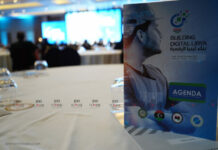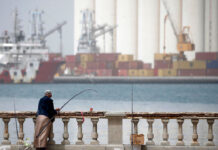
After his refusal to participate in the international conference on Libya “Berlin 2”, Moroccan Foreign Minister Nasser Bourita organized a press conference, during which he explained that there must be a North African solution to the Libyan issue.
Nasser Bourita said, “There is no for Berliner solution to the problem of North Africa!” This came in a press conference held on Thursday, June 24th in Rabat, with Aguila Saleh, Speaker of the Libyan House of Representatives. Thus, the Moroccan Foreign Minister and the Speaker of the Libyan Parliament decided to bypass all stakeholders in the Libyan file meeting in Germany.
In recent decades Libya has enjoyed friendly relations with sub-Saharan African countries. During the rule of Muammar Gaddafi, and despite all the criticism leveled at him during his lifetime, Libya became one of the pan-African refuges.
Whether it is about struggles for independence or development in African countries, the Libyan state has always demonstrated this pan-Africanism that Morocco’s foreign minister seems to have hidden today.
Denis Sassou Nguesso has Always Supported a Peaceful Transition in Libya
The President of Congo-Brazzaville, Denis Sassou Nguesso, has always supported a peaceful transition in Libya, but Morocco and its Western allies do not take this legitimate solution seriously.
Among all African heads of state, Congo-Brazzaville is considered the survivor of the Western Pan-African War, calling for an African solution in Libya, and Denis Sassou Nguesso is chairing the African Union High Level Committee on Libya.
Internet users reacted negatively to Bourita’s statements, who does not seem to consider Libya an African country, as he reduces it to a North African country, no more, a shorthand geographical designation that has much more than one meaning.
The minister seeks to give Morocco greater legitimacy than Algeria’s in the Libyan file while many of the behind-the-scenes speakers speak, on condition of anonymity, about the “arrogance” of Moroccan diplomacy.
Moroccan Kingdom and Libya…
In fact, the Kingdom of Morocco has already made diplomatic efforts during the Libyan crisis, and these efforts are not comparable to those of Uganda, Algeria, Congo, South Africa, or even Ethiopia and Tunisia, not to mention its non-participation in “Berlin 2”.
In 2012, American ships transported NATO forces to Libya, and this fleet captured the small port of ‘Ksar’ in Morocco as a resupply point.
Since 2016, the Moroccan monarchy has allowed these same forces, accused of looting Libya and destroying its infrastructure, to settle within its maritime borders, and when France and the United States arrested Libyan leaders, Moroccan intelligence interrogated them before sending them to secret prisons in the West.
The Diplomatic “Arrogance” of the Moroccan Monarchy
All these facts, as well as Morocco’s passivity towards any peaceful attempt to reunite the Libyans, show the gap between the Moroccan minister’s statements and the possible solution to the Libyan transitional period.
Indeed, Moroccan Foreign Minister Bourita dared, “on the instructions of the King, to join the Libyan efforts to resolve the crisis,” noting once again that the Moroccan monarchy was comprehensive in administrating Libya to the point of interfering in the alleged normal and unconditional relations between the two countries!
Then the minister said: “Morocco listens to the Libyans and does what they want, that is exactly its role.” In addition to Aguila Saleh ‘s visit, Morocco has received Libyan officials six times since 2011 and has made three official visits to Libya. Moroccan diplomacy, however, was not represented at the highest level except in one of these visits.
Morocco has also banned the flow of Libyan travelers for three years in the past decade.
Is the African Solution Still Possible in Libya?
In addition, Morocco does not participate in the Berlin summit not because the procedure appears superficial and is doomed to failure. If truth be told, Morocco is currently in conflict with Germany, due to Berlin’s intervention in the “last offensive” launched by Morocco in Western Sahara, seeking to destroy the Polisario Front.
Morocco also suspended all diplomatic relations with the country. After insisting for a long time that Spain not participate in the Berlin summit, due to the migration crisis, Moroccan diplomacy boycotted the summit.
Finally, the solution in North Africa will involve at least three-way discussions with Algeria and Tunisia. But since the normalization of its relations with Israel, among other things, relations between the three neighboring countries have deteriorated. In addition, Algeria participates in the only African front involved in the Libyan issue, which is the African Union Front.
Ten African Countries Invest without Conditions
While Morocco appears to be engaged in foreign diplomacy over Libya, Congolese President Sassou Nguesso and his counterparts from ten African countries have provided assistance to Libya during the civil wars and talks with Libyan leaders never stopped.
On this complex issue, with the exception of Chad, the nine African countries that spend diplomatic capital do so in a friendly manner. As for the Congo, Mauritania, Niger and South Africa, they are investing more than Libya’s immediate neighbours.
In fact, relations between Morocco and Libya are very few at the moment. The Moroccan people do not stop noticing this interference, which is beginning to appear as opportunistic on the part of their diplomats, while the two peoples share a true friendship and above all a common history.










